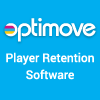As a developer, you want the world to think that you are a thriving company with half a dozen employees destined for greatness in the indie game scene. But Bobby Patteson, the owner and CEO of the Toronto-based company Highcastle Studios, decided to tell the truthful story of making a game that is not on Steam’s top 100 sellers list. Bobby is a former male fashion model, an inventor, an artist, a computer game developer, and in between all that, you can find him doing all the jobs that nobody else wants to do (for the minimum wage, he adds). Highcastle Studios is literally one guy making games with a little help from Jonathan, an intern from last summer, and music commissioned by Matthew Joseph Payne. Bobby defines his goal as “to make weird games that explore new ways to play and interact”. Point Perfect is his first experiment.
Test Your Skills While a Friend is in a Starcraft or LoL Match
The idea of Point Perfect comes out of my love for real-time strategy games and the eSports culture that surrounds it. I noticed that there can be a lot of downtime between games of Starcraft or League of Legends. I thought - wouldn’t it be great if there was a casual game to test your skills while waiting for your friend to get out of their 40-minutes game? And so the concept for Point Perfect was born: the casual game for the hardcore gamer.

At the time, I had a passion for designing games, but absolutely no idea of how to program. So naturally I gravitated towards Gamemaker Studio to build my game. Because of the technical limitations of the engine, I decided to go for retro aesthetics. What is more, I always felt that Point Perfect should have been thought up sooner, and belonged in the 80’s with Tetris and Pong.
Making Fun of Losing the Game
There were many changes and updates of the game during its development. The original idea was to have the player only avoid obstacles with the mouse pointer. It dawned on me, however, that the game would be too similar to free titles that people could play online. There just wasn’t enough depth in mouse-avoidance alone. So I decided to allow the player to fight back by drawing boxes around enemies and blast them to bits with a laser from your mother-ship.

This was the turning point and the most exciting part of doing the game’s design, but it also created some new issues and concerns. After initial playtests, it was evident that people were having extreme difficulty with the two competing tasks of both avoiding obstacles and aggressively selecting enemies to destroy. However, I also noticed that players were keen to figure it out, and there was a strong “just one more try” element to the game.

After a while, the player would adapt and be able to understand the gameplay, but the initial learning curve was very steep. That’s why I decided to add probably the most controversial element to the design: “making fun” of the player for losing! After all, the players who might get offended by this are not the people who would be playing my game in the first place. So the decision came to embrace the difficulty of Point Perfect and try to get the player to laugh about it.
Graphics Define Audience Range
I am very happy with my final product, but there are some things I may have done differently a second time around. The most notable is the importance of the game’s graphics to appeal to all audiences.
It’s very easy for a game to be discriminated because of the graphic design. There’s so much depth and content in Point Perfect, and it breaks my heart when I hear things like “is this a Flash game?” or “this should be free”. Believe it or not, it’s also very easy for the media to have the same opinion based on a first glance. The retro look fits my personal taste and vision for Point Perfect, and while there are many gamers who love it, there are also many demographics that I have found despise this art style, unfortunately. Maybe a better fusion of old and new would have made a difference in making my game more appealing to different audiences.

Point Perfect was picked up by a publisher, Plug In Digital, and distributed over all the major online stores such as Desura, Humble Store, and Steam on July 17, 2014. It has quickly gained the reputation of one of the hardest PC games out there and has been somewhat of a cult hit with YouTube celebrities because of its unique design and crazy sense of humor.
Point Perfect is now available only for Windows PCs, and Bobby might make it MAC and Linux compatible in the future.



















